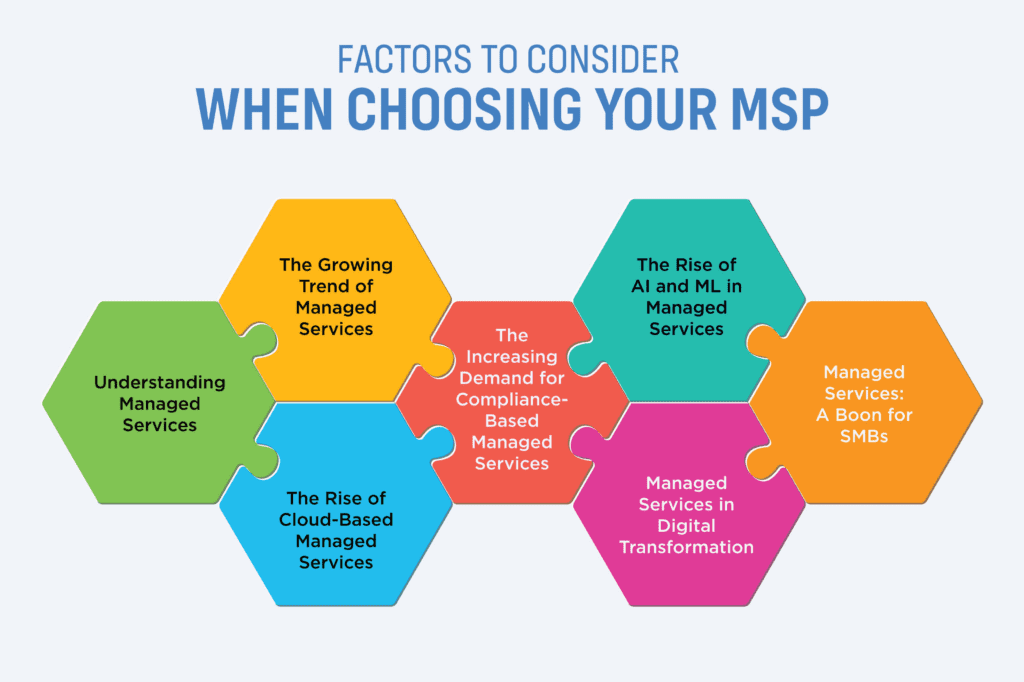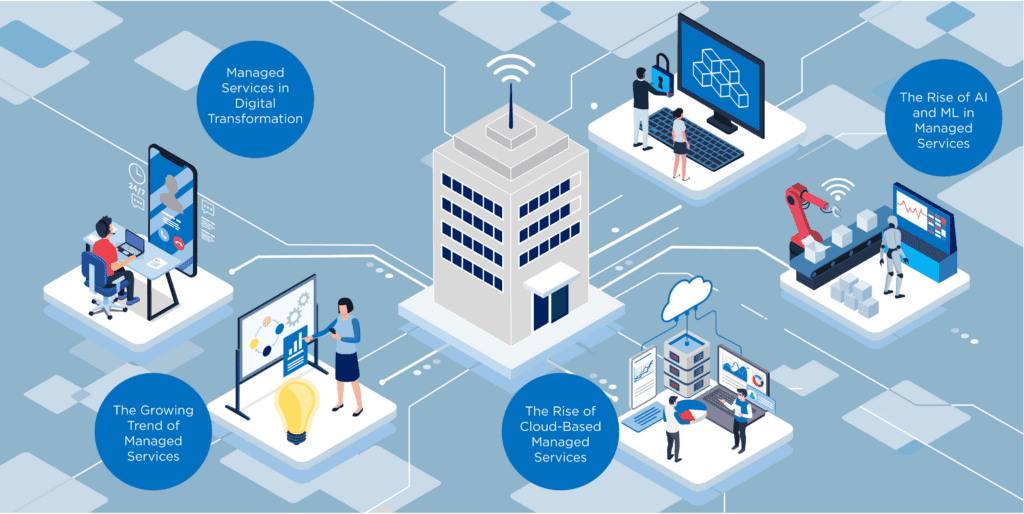Organizations are constantly challenged to keep up with the ever-evolving technology landscape. When implementing new technologies, they must carefully consider their potential and longevity.
Managed services, with their significant benefits and potential for growth, have emerged as a crucial support system for businesses. The fact remains that only 25% of SMBs have opted for managed services so far. The trend has just begun, and the opportunities are widely open for managed services. With every passing day, there is a rapid increase in the number of people looking to opt for managed services. Now let us see what the future holds for managed services.
Understanding Managed Services
Managed services encompass a range of outsourced IT solutions, providing organizations with expert support in managing their technology infrastructure. These services cover areas like IT support, network management, cloud computing, cybersecurity, and more. The core features of managed services include proactive monitoring, regular maintenance, and rapid issue resolution. This model has evolved over the years, addressing the growing complexities of the technology landscape and the increasing demands of businesses.

Managed services have become indispensable for organizations, enabling them to focus on their core competencies while leaving technology management to the experts. The benefits include cost savings, enhanced security, increased productivity, and scalability. As businesses continue to explore new technological advancements, managed services offer a viable solution to keep up with the fast-paced changes and remain competitive.
The Growing Trend of Managed Services
Managed services have gained significant traction in recent years, with many organizations opting for outsourced IT solutions. According to industry reports, the managed services market is projected to reach USD 311.32 billion by 2027, indicating substantial potential for growth. There are various reasons why the need for managed services has been on the rise.
Organizations recognize the importance of technology in their operations, and as technology becomes more complex, the need for specialized expertise rises. Additionally, businesses are seeking cost-effective solutions without compromising on quality and security, making managed services an attractive option.
Moreover, various industries benefit from managed services, including healthcare, finance, manufacturing, and education. From small businesses to large enterprises, managed services cater to a wide range of clients, adapting to their unique requirements and business objectives.
The Rise of Cloud-Based Managed Services:
Cloud-based managed services have emerged as a game-changer in the technology landscape, revolutionizing how businesses handle their IT infrastructure. Due to the widespread availability of cloud computing, companies now have the opportunity to entrust their IT management to external providers. This enables them to concentrate on their primary strengths.
The adoption of cloud-based managed services offers several advantages. First and foremost is the flexibility it provides. Companies can scale their IT resources up or down as needed, enabling cost optimization and resource efficiency. Moreover, cloud services facilitate remote access to data and applications, allowing seamless collaboration and boosting productivity.
The security of businesses is of utmost importance, and cloud-based managed services are often equipped with strong security measures to ensure safety. Trusted providers invest heavily in securing their cloud infrastructure, ensuring data protection and compliance with industry standards and regulations.
Additionally, cloud-based managed services alleviate the burden of managing complex IT systems internally. Organizations can offload tasks like data backups, software updates, and server maintenance to the service provider, thus freeing up valuable internal resources.
The Increasing Demand for Compliance-Based Managed Services:
As businesses navigate a constantly evolving regulatory landscape, the demand for compliance-based managed services has surged. Compliance requirements, such as GDPR, HIPAA, and PCI DSS, impose stringent data protection and privacy standards on organizations. Maintaining compliance can be challenging, particularly for businesses lacking in-house expertise.
Compliance-based managed services offer a comprehensive approach to ensuring adherence to regulatory standards. Service providers with expertise in compliance conduct thorough audits and risk assessments and implement necessary security measures to safeguard sensitive data.
By outsourcing compliance-related tasks to experts, organizations can avoid potential legal and financial repercussions resulting from non-compliance. These services also help businesses stay up-to-date with regulatory changes and swiftly adapt their practices accordingly.
The Rise of AI and ML in Managed Services:
Artificial Intelligence (AI) and Machine Learning (ML) are transforming the managed services landscape. These cutting-edge technologies enable service providers to deliver more proactive, predictive, and efficient solutions to their clients.

Advanced AI and ML algorithms can analyze extensive amounts of data and instantly detect patterns, anomalies, and potential issues. This capability allows managed service providers to predict and prevent IT incidents before they occur, minimizing downtime and disruptions to business operations.
In the realm of cybersecurity, AI-powered tools bolster threat detection and response capabilities. Machine Learning algorithms continuously learn from cybersecurity incidents, enhancing their ability to identify and mitigate new and emerging threats.
Moreover, AI-driven automation streamlines repetitive tasks, allowing IT teams to focus on strategic initiatives. Routine tasks like system monitoring, software updates, and performance optimization can be automated, improving operational efficiency.
AI & ML also play a crucial role in data analytics, enabling organizations to derive valuable insights from their data. Managed service providers can offer data-driven recommendations, helping businesses make informed decisions and drive growth.
Managed Services in Digital Transformation
Digital transformation has become a global trend, reshaping businesses across various sectors. Embracing digitalization is essential for organizations to stay relevant and competitive. Managed services play a pivotal role in facilitating digital transformation by managing IT infrastructure, application development, data analytics, and customer experience enhancement.
Organizations embarking on digital transformation journeys face various challenges, including legacy system integration, data security concerns, and resource constraints. Managed service providers offer tailored solutions, easing the transition process and ensuring a smooth transformation.
Managed Services: A Boon for SMBs
Managed services are beneficial for small and medium-sized businesses (SMBs) with limited resources and budgets. Outsourcing IT management allows SMBs to access specialized expertise without investing in costly in-house infrastructure. Managed service providers offer flexible and scalable solutions catering to the specific needs of SMBs.
The Indian Scenario: Digital Transformation Initiatives and Smart Cities
In India, digital transformation initiatives have gained momentum across sectors. The government has invested significantly in transforming cities into smart cities, emphasizing technology-driven solutions for urban development. The rise of smart cities creates a substantial market for managed services, with increasing demand for data storage, security, and network management.
The Future Predictions and Market Projections for Managed Services
The future of managed services looks promising, with significant growth potential driven by the Industry 4.0 revolution and digital transformation initiatives. With the emergence of new technologies, managed services providers will be crucial in assisting organizations to utilize their potential.
The Internet of Things (IoT) is an innovative technology that will significantly impact managed services in the future. With an abundance of data generated by IoT devices, efficient management and analysis are necessary. Managed service providers are well-positioned to handle the management of IoT-related data, ensuring its security and reliability.
Edge computing is also gaining traction, driven by the need for real-time data processing and reduced latency. As more organizations embrace edge computing, managed services providers will be at the forefront of managing distributed IT environments and ensuring seamless connectivity between edge devices and centralized systems.
One of the driving factors behind this forecasted growth is the rapid pace of technological advancements. As industries transition towards smart technologies, cloud computing, and digital transformation, the complexity of IT management increases. Managed services providers offer specialized expertise and solutions tailored to meet these evolving needs. Organizations find value in accessing a comprehensive suite of IT services at a cost-effective price without having to invest in expensive in-house infrastructure and personnel.
Key Players and Competitive Landscape in the Managed Services Industry
In the competitive landscape, differentiation is crucial for success. Managed service providers are continually innovating, incorporating cutting-edge technologies like AI, automation, and predictive analytics to enhance service offerings. The ability to deliver proactive, value-driven solutions that address the unique challenges faced by businesses sets apart the leaders in the industry.
Customer-centricity and strong client relationships are essential for sustained success in the managed services industry. Providers that prioritize understanding the specific needs of their clients and aligning their services accordingly tend to build long-lasting partnerships and earn customer loyalty.
The managed services industry’s competitive environment will keep changing as new technologies emerge, and companies look for innovative solutions to stay ahead of the dynamic technology landscape.
As the demand for specialized and comprehensive managed services grows, the industry is likely to witness further consolidation, strategic partnerships, and a focus on delivering transformative solutions to meet the ever-changing needs of businesses.
The Road Ahead: Embracing Managed Services
Organizations must recognize the importance of early adoption and strategic partnerships with managed service providers. Leveraging managed services will future-proof businesses and enable them to thrive in the dynamic world of technology.
In the future, managed services will encompass cloud-based solutions, compliance strategies, and AI/ML. Cloud-based services provide flexibility, scalability, and security, while compliance-focused services assist in adhering to regulations and reducing risks. Incorporating AI/ML enables proactive IT management, enhanced cybersecurity, and data-driven decision-making.
In today’s constantly evolving technology world, businesses must embrace the latest trends in managed services to seize the opportunities they offer. By partnering with reputable managed service providers and leveraging the latest innovations, organizations can stay ahead in the dynamic and competitive business world, ensuring a successful and sustainable future.
Boost efficiency and security with Impiger Technologies’ managed services. Optimize your IT with zero-touch Ecosystems and stay ahead of the tech curve.
Let Impiger Technologies be your partner in next-gen managed services for seamless IT management and success.











